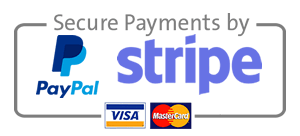Pro
Loaders
| Loader type | The loader used for lazy load
|
| Default loader | Selectable animated loaders provided with the extension, by default: |
| Data URI | The encoded image data that will be used as loader. The format is: data:[mime type];charset=[charset];base64,[encoded data] |
| Image | The image (animated or not) that will be used as loader |
Those animations are used while the sliders are loading, giving users a visual feedback.
Shared options
| Site mode |
|
| Bootstrap compatibility | If you are using a Bootstrap template, select which version of Bootstrap your template is compatible with. It will ensure the extension outputs the proper classes for the Bootstrap version you are using. The Joomla option loads the Bootstrap version packaged with Joomla (which is the default behavior). All other options WILL NOT load Bootstrap. The extension can function without the Bootstrap framework. Select None |
| Show errors | When getting un-expected output results, show error messages to troubleshoot what the issues may be |
| Images | |
|---|---|
| Reset pictures | Whether to re-create the image thumbnails every time the page is loaded or not. 'No' will improve server performance once the module is properly configured and ready for prime time |
| Images cache path | The path for the thumbnails created (by default, in the media folder under /thumbnails/trs). It is possible to save the files to the temporary folder of the Joomla configuration or the /cache folder (/media/cache under Joomla 4) |
| WEBP/AVIF fallback | The image type of the fallback images when using images of WEBP or AVIF type (jpg or png) |
| Stylesheets and scripts | |
| Joomla 4 Lazyload stylesheets |
It is possible to lazy load some stylesheets like icon fonts. It is a feature included in Joomla 4 but it must be supported by the site's template on the public side. You can enable lazy loading for all Simplify Your Web extensions at once and even add support for it if the template does not. To do so, you need to enable the feature in the SimplifyYourWeb extensions System plugin |
| Inline scripts | Include scripts directly into the HTML source code, reducing the amount of HTTP requests. The scripts are small enough so that writing them into the source may have a better performance than calling them through files |
| Remote libraries | Whenever possible, load third-party libraries remotely (from a Content Delivery Network) for improved performance |
| Reset header files | Re-creates the cached stylesheets and scripts after style modifications have be made. 'No' will improve server performance once the view or module is properly configured and ready for prime time |
Stylesheets and scripts are cached in the /cache folder. Deleting the cached files from the administrator console (System -> Clear Cache
) prevents resetting the Reset Header Files parameter to 'yes' when changes are made.
However, it is no longer possible to manually remove the files from the console under Joomla 4, as the files are now cached in the /media/cache folder.



